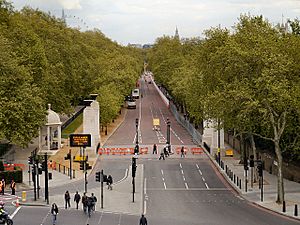Constitution Hill, London facts for kids

Constitution Hill is a famous road in London, England. It's located in the City of Westminster and connects The Mall (right near Buckingham Palace) to Hyde Park Corner. This road is bordered by the beautiful Buckingham Palace Gardens and Green Park. Even though it's called "Hill," it's actually quite flat!
This route was originally an old lane. It was improved in the 1820s when Buckingham Palace was being built. It became an official path from the palace to Hyde Park. Today, Constitution Hill is closed to cars and other traffic on Sundays, making it a great place for people to walk or cycle.
Contents
History of Constitution Hill
Constitution Hill got its name in the 1600s. King Charles II used to enjoy taking his daily "constitutional" walks there. A "constitutional" walk is a short walk taken regularly for your health.
In a map from 1720, it was called "Road to Kensington." But by 1724, in John Smith's map, it was officially named "Constitution Hill."
Key Events on Constitution Hill
This historic road has been the scene of several important events.
Queen Victoria's Close Calls
Constitution Hill was where three attempts were made on the life of Queen Victoria. These happened in 1840, 1842, and 1849. Luckily, the Queen was unharmed in all these incidents.
Sir Robert Peel's Accident
In 1850, Sir Robert Peel, who was a former Prime Minister and a leader of the Conservative Party, had a serious accident here. He was thrown from his horse near the gate into Green Park. Sadly, he was badly injured and passed away three days later.
Landmarks and Memorials
At one end of Constitution Hill, you'll find the impressive Wellington Arch at Hyde Park Corner. This grand arch was originally meant to be the main entrance to the route.
Near the top of Constitution Hill, close to Hyde Park Corner, there is a special war memorial. This memorial honors soldiers from the Commonwealth countries who served in the two World Wars. It is known as the Memorial Gates.
Modern Changes and Preservation
In the 1960s, large concrete lamp posts were put up on Constitution Hill. However, thanks to the quick actions of comedian and environmentalist Spike Milligan, these modern posts were removed within days. Because of his efforts, the older, traditional gas lamps are still there today, keeping the historical feel of the road.
Other Constitution Hills
It's interesting to know that Constitution Hill isn't the only road with this name. For example, there's another street called 'Constitution Hill' in the city of Birmingham, England.
See also
 In Spanish: Constitution Hill para niños
In Spanish: Constitution Hill para niños

